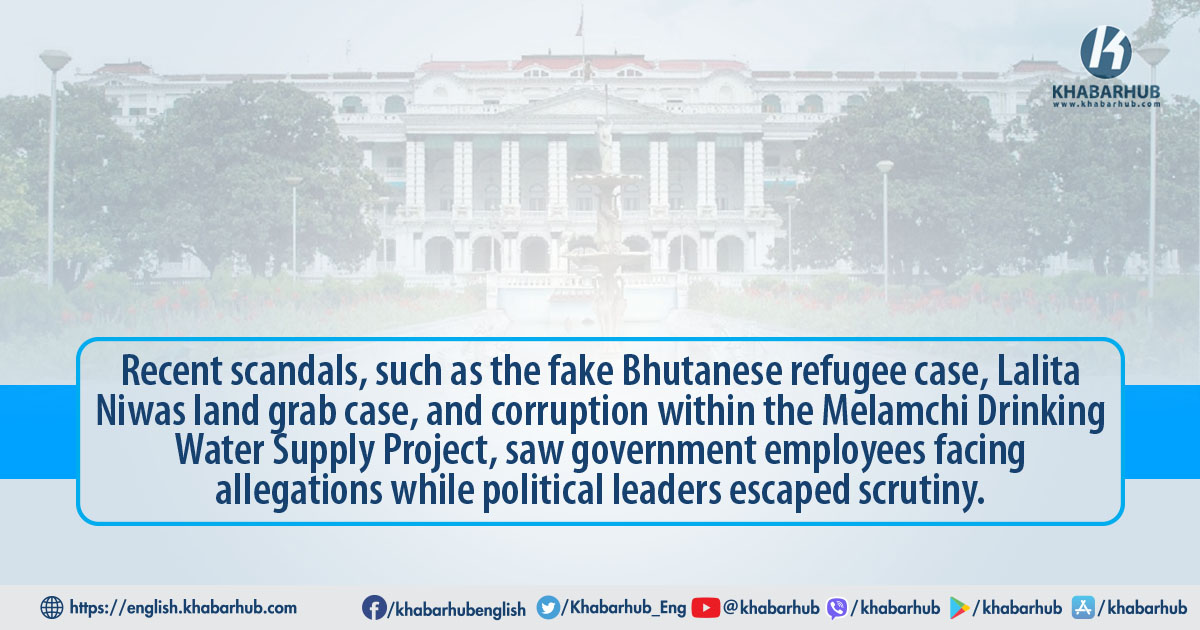KATHMANDU: With a growing perception that political leaders are deflecting blame onto employees, a sense of fear has permeated government workers, hindering their willingness to endorse significant decisions or voice opinions.
Recent scandals, such as the fake Bhutanese refugee case, Lalita Niwas land grab case, and corruption within the Melamchi Drinking Water Supply Project, saw government employees facing allegations while political leaders escaped scrutiny.
This trend of shielding ministers and blaming employees has impacted personnel administration both within Singha Durbar and nationwide.
While holding corrupt employees accountable is justifiable, the panic and dissatisfaction arise when ministers and secretaries share responsibility for the same decisions.
In the Lalita Niwas land grab case, the former secretary of the Ministry of Land Reforms, Chhabiraj Panta, and Dip Basnyat were found guilty.
The employees implicated include Prem Bahadur Khapung, Arjun Khatiwada, Shankar Subedi, Angur Sigdel, Kedar Prasad Shrestha, Harikrishna Timilsina, Parashuram Pokharel, Krishna Poudel, and Tanka Bhatta.
Basnyat and Panta were held responsible for a decision and proposal to expand the land of the Prime Minister’s residence.
In contrast, former Prime Ministers Madhav Nepal and Dr. Baburam Bhattarai, also implicated, received immunity from authorities.
However, a concerning trend has emerged where the political leadership tends to blame employees, creating a perception of virtue on their part while implicating staff in various corruption incidents.
The special court acquitted former Deputy Prime Minister Bijay Kumar Gachchadhar, former ministers Dambar Shrestha, Chandradev Joshi, and other leaders involved in the case.
This pattern repeats, as the court absolves political leaders while penalizing the staff, accusing them of influencing ministers during the proposal presentation to the Council of Ministers.
The Melamchi Project case also follows a similar narrative, with authorities filing charges against employees, sparing the political leadership from scrutiny.
The persistence of such cases raises concerns about the fairness and transparency of the judicial process and its impact on employee morale and turnover within the government.
The Commission for Investigation of Abuse of Authority (CIAA) recently engaged in discussions with former Ministers of Communication and Information Technology, Mohan Bahadur Basnet and Gyanendra Bahadur Karki, regarding the procurement of the Telecommunication Traffic Monitoring and Fraud Control System (Teramox).
However, in a surprising turn of events, Mahendra Man Gurung, the Secretary of the Government of Nepal, found himself under investigation and accused.
The investigation also extends to the then Communications Secretary, Baikuntha Aryal (currently serving as Chief Secretary to the Government), who has provided a written statement.
The Commission has also taken a statement from Purushottam Khanal, the former Chairman of Nepal Telecommunication Authority, who resigned amidst the escalating corruption case.
Secretary Madhu Marasini, implicated in the National Payment Gateway case related to this incident, is currently under suspension.
The CIAA has filed a case against Marasini, former Executive Director of National Information Technology Center Pranita Upadhyaya, Managing Director of Nepal Telecom Sunil Paudel, former Secretary and then Executive Director of National Information Technology Center Sanjay Sharma, and seven others in a special court.
The surge in major corruption scandals resulting in political leaders being acquitted while employees are held responsible has noticeably slowed down the decision-making process within the administration system.
Following the implication of the incumbent Communications Secretary in the Lalita Niwas land grab case, secretaries met with the Prime Minister, drawing attention to the situation.
Officials argue that the apprehension stems from the scrutiny and investigations conducted by authorities and media coverage, discouraging employees from participating in vital decision-making processes.
Meanwhile, political leaders argue that there is a systemic flaw in the administration, emphasizing the need for restructuring.
However, a concerning trend has emerged where the political leadership tends to blame employees, creating a perception of virtue on their part while implicating staff in various corruption incidents.
Former Chief Secretary Bimal Prasad Koirala urges caution, stating, “While the court’s decision must be respected, it should not be misconstrued to brand employees participating in the decision-making process as guilty.”
The intersection of legal proceedings and the impact on the government’s functioning raises questions about accountability and the fairness of the judicial process.
A growing sentiment of reluctance and hesitation among ministers and government staff has emerged, with complaints about employees being unwilling to participate in decision-making processes.
This trend has been attributed to the recent activities of the Abuse of Authority Investigation Commission, the National Vigilance Center, and the outcomes of Special Court verdicts.
Ministerial discontent is palpable as many officials voice concerns about employees’ reluctance to engage in crucial decision-making.
Complaints from customers also highlight staff unwillingness to use their pens to sign off on decisions.
The Director General is reportedly afraid to attend the department, seeking a transfer due to the impact of the ongoing uncertainty and legal proceedings.
Officials argue that the apprehension stems from the scrutiny and investigations conducted by authorities and media coverage, discouraging employees from participating in vital decision-making processes.
A Ministry of Tourism official notes, “Whenever there’s a significant issue, discussions begin, but employees are hesitant to partake in crucial decision-making due to the recent events scrutinized by authorities and the media.”
The impact of legal actions on decision-making is evident in various sectors.
For instance, on January 24, the CIAA filed a case against eight individuals, including the former general manager of Udayapur Cement Industry, Surendra Kumar Paudel.
Consequently, industry employees hesitate to adhere to rules, leading to difficulties in procuring necessary equipment and raw materials, hindering the industry’s operations.
Sources reveal that the resignation of the then executive director of Nepal Oil Corporation, Umesh Thani, with over a year left in his term, was influenced by political pressure to establish a 6 billion-worth fuel storage room at the airport.
Additionally, the Director General of the transport system department faces challenges in deciding on the payment of over 60 million for Madras Security Printing, a purchase made a decade ago.
The Director General is reportedly afraid to attend the department, seeking a transfer due to the impact of the ongoing uncertainty and legal proceedings.
The pervasive fear of legal repercussions is casting a shadow over the efficiency and functionality of Singha Durbar.









Comment